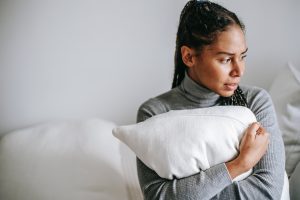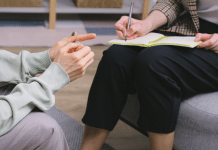 When I was in 2nd grade, we were playing kickball for PE. I was sitting on the bench waiting for my turn to kick. Sitting there, I could feel my stomach churning, and the closer it got to my turn the more my stomach started to cramp up. Before I even stepped up to the plate, I was in tears in the office calling my mom to pick me up.
When I was in 2nd grade, we were playing kickball for PE. I was sitting on the bench waiting for my turn to kick. Sitting there, I could feel my stomach churning, and the closer it got to my turn the more my stomach started to cramp up. Before I even stepped up to the plate, I was in tears in the office calling my mom to pick me up.
In 6th grade, I was at a new school and didn’t know anyone. The group of girls I befriended made fun of me daily. It got to the point where I’d be physically ill before school. Some days I would call my grandma to pick me up before the bus even arrived at the bus stop. In many instances–lunch, field trips, bus rides–my hands would be clammy and I could sense my vision narrowing because my heart would start racing. My grades were great and I never acted out, so I seemed fine on the outside.
In high school, I was known as the “quiet one.” By the time I finished overthinking conversations in my head, the moment to speak up had passed. Thankfully, I made a group of friends who did not make fun of me and managed to pull me out of my shell. Though that still didn’t keep me from feeling anxious. Oftentimes I would skip going to things because the thought of being in a new place overshadowed any idea of fun. I was perfectly fine staying at home or going to a friend’s house if it meant it was low-key. Academically I was a high achiever through elementary, high school, and even college.
On the outside, I had nothing to worry about.
Fast forward to my early teaching years. If I had a parent conference I wouldn’t eat all day because I knew it’d make me sick. The same thing would happen during observations–I would lose sleep the night before, avoid eating, and sweat my way through the lesson. Sometimes I’d experience this even on days when I wasn’t being observed…for no rhyme or reason. When I got my first Fitbit, I was in for another surprise–my heart rate was through the roof throughout the day (100+ BPM). After a year of use, I looked at my heart rate trend and I could see noticeable dips and spikes that aligned perfectly with school breaks.
A long time ago, I self-diagnosed myself with “nervous stomach” – those unexplained bouts of stomach pains usually accompanied by feeling anxious about literally anything. It’s never been on my list of things to discuss with people. Frankly, it’s embarrassing. My stomach hurts because I’m nervous about…? What am I anxious about? I have everything under control, there’s no crisis going on, and I’m good at my job. I have a family who loves me, and I live a relatively comfortable life.
Anything I feel anxious about must certainly all be in my head.
School Year 2020-2021. Masks. Quarantines. Teaching in person and virtual at the same time. Presidential election.
I had to be at work extra early for safety screenings. I stopped eating breakfast because my day started so early. At lunch, the topic of conversation stayed on current events. I stopped eating lunch because my stomach would be in knots. Then I stayed in my classroom during lunch to avoid the bombardment of Covid and election debates. I went through the whole school year like that. I lost weight, and I even lost friends.
Over the summer things seemed to be getting better. And then they weren’t. Two days back at work and my stomach hurt so bad I couldn’t even sit through a faculty meeting. I decided enough was enough. I set up an appointment with a gastroenterologist. She ran test after test. On paper, everything was fine. Except I knew I wasn’t all fine.
It was then she talked to me about the mind-gut connection and brought up the idea of anti-anxiety medication.
It took a few months, but gradually I noticed a difference in even the little things.
I didn’t have to do deep breathing on my drive to work. I could eat breakfast again. My heart wouldn’t randomly start racing and my stomach didn’t cramp up after lunch. I reached out to old friends and even started making a couple of new ones. There have been times when I knew I’d have an anxiety attack in the past–going to a concert, driving to Houston by myself, speaking in front of a group of peers–and I didn’t. I’d keep waiting, expecting those physical symptoms to kick in, and they wouldn’t. I realized the anxiety meds were really working.
So many times I’d mention feeling anxious to someone and they’d respond “you don’t seem nervous; you’re always so confident and calm.” Maybe that’s why it took me over 30 years to finally seek out help. I thought it was just in my head. Most people probably didn’t know about my struggle with anxiety until I recently started opening up about it.
I wish I knew that feeling physically ill wasn’t something I was intentionally doing to myself. I wish there was more understanding given by myself and others. I wish people knew that anxiety isn’t something you can just turn on or off, or that it’s something you could see on the outside.
















